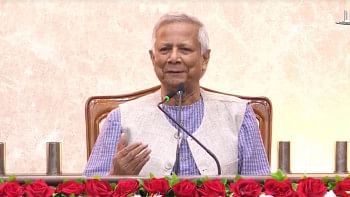FDI for apparel to be allowed in special economic zones: Tofail
The government will allow foreign direct investment (FDI) in the readymade garment sector in special economic zones (SEZ) and high-end fashion items in Bangladesh, Commerce Minister Tofail Ahmed said yesterday.
Investors from many countries have been lobbying governments over the years to get permission to invest in the ready-made garment sector outside of the export processing zones (EPZ), but the FDI was confined in the specialised areas.
The minister agreed that there is no official bar in investment in the garment sector by foreign entrepreneurs outside of the EPZs, but usually such investment is not allowed outside of the EPZs to protect domestic investors.
“However, we will allow FDI in garment sector in the SEZs as the government has been working to develop 100 such economic zones across the country,” the minister said, adding that currently foreign investors were allowed to invest in high-end fashion items even outside of EPZs.
No SEZ has started functioning yet although the Bangladesh Economic Zones Authority has been working hard to develop such zones across the country either by leasing out land to individual local companies or to countries like Japan, India and China.
Many garment manufacturing companies from China, Japan and Mexico want to relocate their factories to Bangladesh, but the government cannot allow them at a wholesale rate as local entrepreneurs have a lot of investment in the apparel sector, the minister said.
The government has already allocated an SEZ for Japanese investors in Bangladesh. The Japanese investors can invest in SEZs in Bangladesh, Ahmed told reporters after a meeting with Japanese Ambassador in Bangladesh Masato Watanabe at his secretariat office yesterday.
Currently, the number of Japanese investors in Bangladesh is 350, of which many are big multinational companies, the minister said, adding that even 10 years ago the number of Japanese companies in the country was 50.
Bangladeshi exports, especially apparel items, have been increasing to Japan, riding on a zero-duty benefit under relaxed rules of origin of Japan. Exports of garment products to the far-eastern nation -- whose apparel market is worth about $40 billion a year -- raked in $744.47 million last fiscal year, according to data from Bangladesh Export Promotion Bureau.
Overall exports to Japan also declined 5.6 percent to $1.01 billion in fiscal 2016-17. Japan is the only destination in Asia where Bangladesh's overall exports crossed the $1 billion mark in each of the previous two years.
Garment shipments to Japan from Bangladesh began after the adoption of “China Plus One” policy by the Japanese government in 2008 to reduce overdependence on China for goods like apparel, electronic gadgets and home appliances.
The “China Plus One” policy was supplemented by the relaxation of the Rules of Origin by the Japanese government for least-developed countries, which worked in Bangladesh's favour.
Bangladeshi garment manufacturers have been enjoying zero-duty benefit on apparel exports to Japan even if the raw materials were imported. The fiscal stimulus package introduced by the government for new markets in 2009 has also helped in boosting exports to Japan.
Not only garment items, shipment of leather goods and leather shoes from Bangladesh to Japan in recent years is on the rise due to the duty benefit and quality products, the minister said.
Ahmed said Japan was in the process of investing $6 billion to develop the Matarbari power plant at Cox's Bazar.
“Our bilateral relationship is very positive. The relationship between the two countries will grow further in future,” said Watanabe, who will be going back to Japan very soon following the completion of his stint in Bangladesh.

 For all latest news, follow The Daily Star's Google News channel.
For all latest news, follow The Daily Star's Google News channel. 



Comments